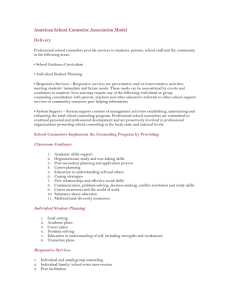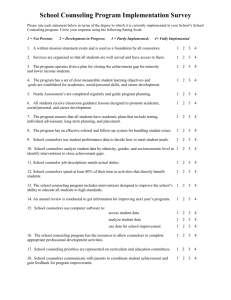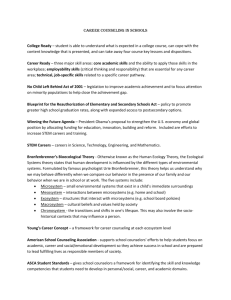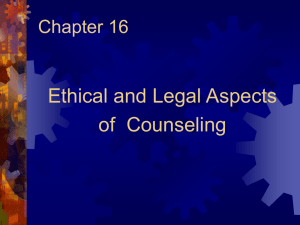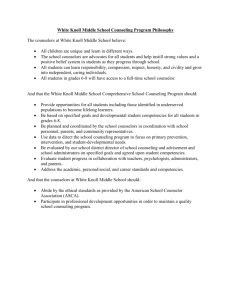Our Ethical Decision
advertisement
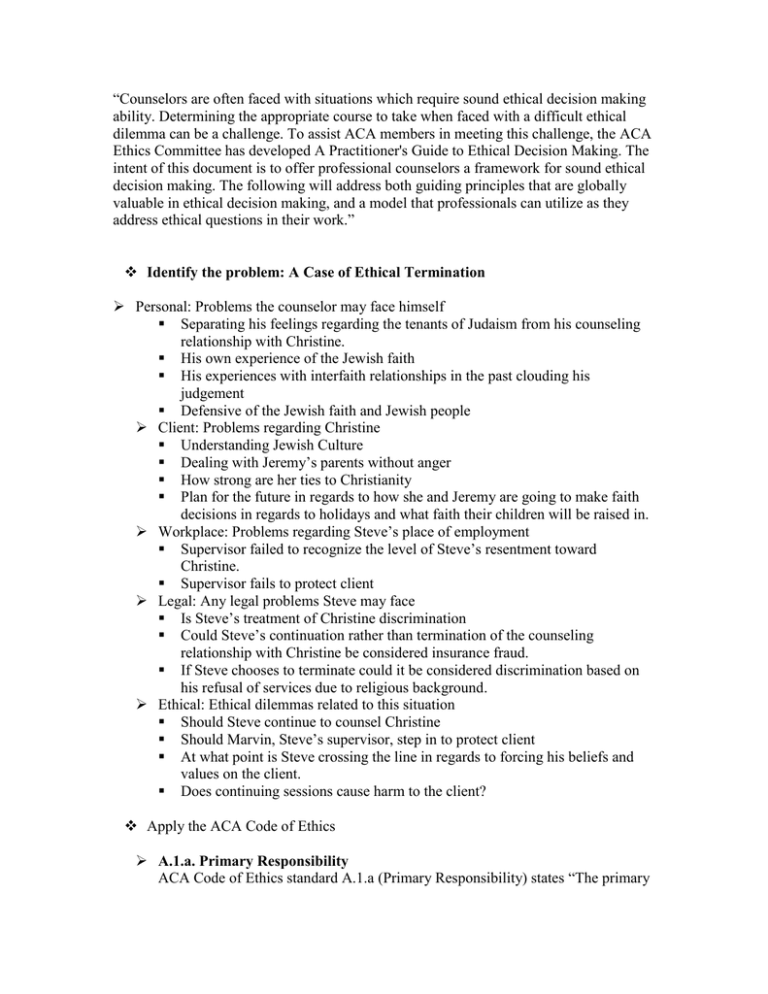
“Counselors are often faced with situations which require sound ethical decision making ability. Determining the appropriate course to take when faced with a difficult ethical dilemma can be a challenge. To assist ACA members in meeting this challenge, the ACA Ethics Committee has developed A Practitioner's Guide to Ethical Decision Making. The intent of this document is to offer professional counselors a framework for sound ethical decision making. The following will address both guiding principles that are globally valuable in ethical decision making, and a model that professionals can utilize as they address ethical questions in their work.” Identify the problem: A Case of Ethical Termination Personal: Problems the counselor may face himself Separating his feelings regarding the tenants of Judaism from his counseling relationship with Christine. His own experience of the Jewish faith His experiences with interfaith relationships in the past clouding his judgement Defensive of the Jewish faith and Jewish people Client: Problems regarding Christine Understanding Jewish Culture Dealing with Jeremy’s parents without anger How strong are her ties to Christianity Plan for the future in regards to how she and Jeremy are going to make faith decisions in regards to holidays and what faith their children will be raised in. Workplace: Problems regarding Steve’s place of employment Supervisor failed to recognize the level of Steve’s resentment toward Christine. Supervisor fails to protect client Legal: Any legal problems Steve may face Is Steve’s treatment of Christine discrimination Could Steve’s continuation rather than termination of the counseling relationship with Christine be considered insurance fraud. If Steve chooses to terminate could it be considered discrimination based on his refusal of services due to religious background. Ethical: Ethical dilemmas related to this situation Should Steve continue to counsel Christine Should Marvin, Steve’s supervisor, step in to protect client At what point is Steve crossing the line in regards to forcing his beliefs and values on the client. Does continuing sessions cause harm to the client? Apply the ACA Code of Ethics A.1.a. Primary Responsibility ACA Code of Ethics standard A.1.a (Primary Responsibility) states “The primary responsibility of counselors is to respect the dignity and to promote the welfare of clients.” In the discriminatory ways Steve treated Christine, and in how he imposed his own values onto her so fervently, he was not promoting her welfare or respecting her dignity. He was not trying to help her solve her problems, but he was using her to further his own agenda that religious intermarriage is wrong. A.11.a. Abandonment Prohibited Steve the counselor violated ACA Code of Ethics standard A.11.a (Abandonment Prohibited) which states “Counselors do not abandon or neglect clients in counseling. Counselors assist in making appropriate arrangements for the continuation of treatment, when necessary, during interruptions such as vacations, illness, and following termination.” In reading this case, it was apparent that Steve gave Christine little help because he was prejudiced in his views on religious intermarriage. It can be argued that Steve abandoned Christine as a client from the very beginning when he made a treatment goal that was not inline with what Christine wanted or needed out of counseling. Steve also did not supply Christine with appropriate arrangements for the continuation of treatment after depleting her insurance coverage. A.11.b. Inability to Assist Clients Another ACA Code of Ethics standard violated in this case is A.11.b (Inability to Assist Clients). A.11.b states “If counselors determine an inability to be of professional assistance to clients, they avoid entering or continuing counseling relationships. Counselors are knowledgeable about culturally and clinically appropriate referral resources and suggest these alternatives. If clients decline the suggested referrals, counselors should discontinue the relationship.” According to this code, it would have been more ethical for Steve to discontinue his relationship with Christine as soon as realized that he could not move past his prejudice and own world view enough to be an effective counselor for Christine. He should have recognized his inability to help Christine and sent her to another counselor rather than depleting her insurance coverage trying to achieve his own goals. A.11.c. Appropriate Termination ACA Code of Ethics Standard A.11.c (Appropriate Termination) states “Counselors terminate a counseling relationship when it becomes reasonably apparent that the client no longer needs assistance, is not likely to benefit, or is being harmed by continued counseling. Counselors may terminate counseling when in jeopardy of harm by the client, or another person with whom the client has a relationship, or when clients do not pay fees as agreed upon. Counselors provide pre-termination counseling and recommend other service providers when necessary.” Steve violated this code by terminating counseling with Christine without having provided pretermination counseling, previously discussing the limits of Christine’s insurance coverage, and recommending suitable other service providers. A.11.d. Appropriate Transfer of Services ACA Code of Ethics standard A.11.d (Appropriate Transfer of Services” states that “When counselors transfer or refer clients to other practitioners, they ensure that appropriate clinical and administrative processes are completed and open communication is maintained with both clients and practitioners.” This code comes into play because Steve should have transferred Christine’s counseling services earlier on by referring her to another practitioner. He should have done this after taking note of his strong, negative reaction to Christine, and the recognition of his own agenda to encourage Christine that marrying a Jewish man was wrong.For this case, it’s important to look at the ASCA Code of Ethics, as well as the ACA code of ethics. These codes are similar; however the ASCA code focuses more on specifically counseling minors than does the ACA code. A.4.b. Personal Values Steve violated ACA Code of Ethics standard A.4.b (Personal Values), which states “Counselors are aware of their own values, attitudes, beliefs, and behaviors and avoid imposing values that are inconsistent with counseling goals. Counselors respect the diversity of clients, trainees, and research participants.” From the moment Steve decided that his goal in counseling Christine was to convince her to end the engagement, he was breaching this ethical standard. Steve personally believed that non-Jews and Jews should not get married, had a strong reaction to Christine, and could not help but interject his personal values into the therapeutic process. A.4.a. Avoiding Harm A.4.a (Avoiding Harm) states “Counselors act to avoid harming their clients, trainees, and research participants and to minimize or to remedy unavoidable or unanticipated harm.” By using up Christine’s insurance coverage and not helping her with her problem since it was against his values, Steve undoubtedly inflicted harm on Christine. Now, she has used up her insurance coverage, received little to no help along they way, and will have trouble affording another counselor who can actually help her move forward. C.5. Nondiscrimination ACA Code of Ethics standard C.5 (Nondiscrimination) applies greatly to this case. C.5 states that “Counselors do not condone or engage in discrimination based on age, culture, disability, ethnicity, race, religion/spirituality, gender, gender identity, sexual orientation, marital status/partnership, language preference, socioeconomic status, or any basis proscribed by law. Counselors do not discriminate against clients, students, employees, supervisees, or research participants in a manner that has a negative impact on these persons.” By treating Christine in a way that was not helpful to her, and imposing his own religious values on her, Steve was discriminating against Christine’s religion/spirituality. F.1.a. Client Welfare ACA Code of Ethics Standard F.1.a (Client Welfare) states that "A primary obligation of counseling supervisors is to monitor the services provided by other counselors or counselors-in-training. Counseling supervisors monitor client welfare and supervisee clinical performance and professional development. To fulfill these obligations, supervisors meet regularly with supervisees to re- view case notes, samples of clinical work, or live observations. Supervisees have a responsibility to understand and follow the ACA Code of Ethics." Marvin, Steve's supervisor, violated this standard by not doing more to ensure that Steve was keeping his personal values out of his counseling relationship with Christine. After Steve told Marvin that there was an issue here, Marvin should have monitored Christine's welfare more closely. F.4.c. Standards for Supervisees ACA Code of Ethics Standard F.4.c (Standards for Supervisees) states that "Supervisors make their supervisees aware of professional and ethical standards and legal responsibilities. Supervisors of post-degree counselors encourage these counselors to adhere to professional standards of practice." Marvin violated this ethical code by not taking greater measures to ensure that Steve understood the ethical and legal implications of discriminating against Christine in the way he did. Marvin could have done more to help Steve understand why he is feeling how he is feeling and how to avoid letting his personal reactions influence the counseling process. Nature and Dimensions of the Dilemma Moral Principals Applied to the Case Autonomy Is Christine Beneficence Steve should Potential Courses of Action Inform Jenny's mother without speaking to Jenny first Meet with Jenny again, talk over all of her options and try to get her to tell her mother Let Jenny decide on her own what's best for her Tell the principal or other supervisor about Jenny's situation and let them decide what to do Potential consequence Select course of actions If we were Steve, we would "Implement the course of action Holly Forester-Miller, Ph.D. Thomas Davis, Ph.D. Copyright © 1996, American Counseling Association. A free publication of the American Counseling Association promoting ethical counseling practice in service to the public. -- Printed and bound copies may be purchased in quantity for a nominal fee from the Online Resource Catalog or by calling the ACA Distribution Center at 800.422.2648.

